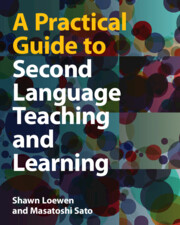Book contents
- A Practical Guide to Second Language Teaching and Learning
- Reviews
- A Practical Guide to Second Language Teaching and Learning
- Copyright page
- Dedication
- Contents
- Figures
- Tables
- Preface
- Acknowledgments
- 1 Language Acquisition
- 2 Second Language Acquisition
- 3 Instructed Second Language Acquisition
- 4 Input, Interaction, and Output
- 5 Grammar
- 6 Vocabulary
- 7 Pronunciation
- 8 Pragmatics
- 9 Academic Language Skills
- 10 Cognitive Individual Differences
- 11 Psychological Individual Differences
- 12 Social Individual Differences
- 13 The Research–Practice Dialogue
- Key Terms
- Index
- References
13 - The Research–Practice Dialogue
Published online by Cambridge University Press: 03 May 2024
- A Practical Guide to Second Language Teaching and Learning
- Reviews
- A Practical Guide to Second Language Teaching and Learning
- Copyright page
- Dedication
- Contents
- Figures
- Tables
- Preface
- Acknowledgments
- 1 Language Acquisition
- 2 Second Language Acquisition
- 3 Instructed Second Language Acquisition
- 4 Input, Interaction, and Output
- 5 Grammar
- 6 Vocabulary
- 7 Pronunciation
- 8 Pragmatics
- 9 Academic Language Skills
- 10 Cognitive Individual Differences
- 11 Psychological Individual Differences
- 12 Social Individual Differences
- 13 The Research–Practice Dialogue
- Key Terms
- Index
- References
Summary
This final chapter revisits all the issues discussed in the textbook in light of their applicability to the real classroom, that is, the relationship between research and practice. It argues for the importance of considering the usefulness of research if and when a researcher hopes to influence classroom teaching via their research. The chapter begins with a description as to how research in general is connected to our daily lives (e.g., medicine, engineering, education). It then overviews the research examining the impact of research on educational practices including second language teaching. Practical and epistemological obstacles to bridging the research–practice gap from practitioners’ and researchers’ sides are discussed. The chapter proposes a variety of actions that practitioners and researchers can take in order to foster a bidirectional, constructive, productive, equitable, and mutually beneficial relationship. The chapter ends with a series of activities designed to ensure the learning outcomes from the textbook.
Keywords
Information
- Type
- Chapter
- Information
- A Practical Guide to Second Language Teaching and Learning , pp. 282 - 301Publisher: Cambridge University PressPrint publication year: 2024
